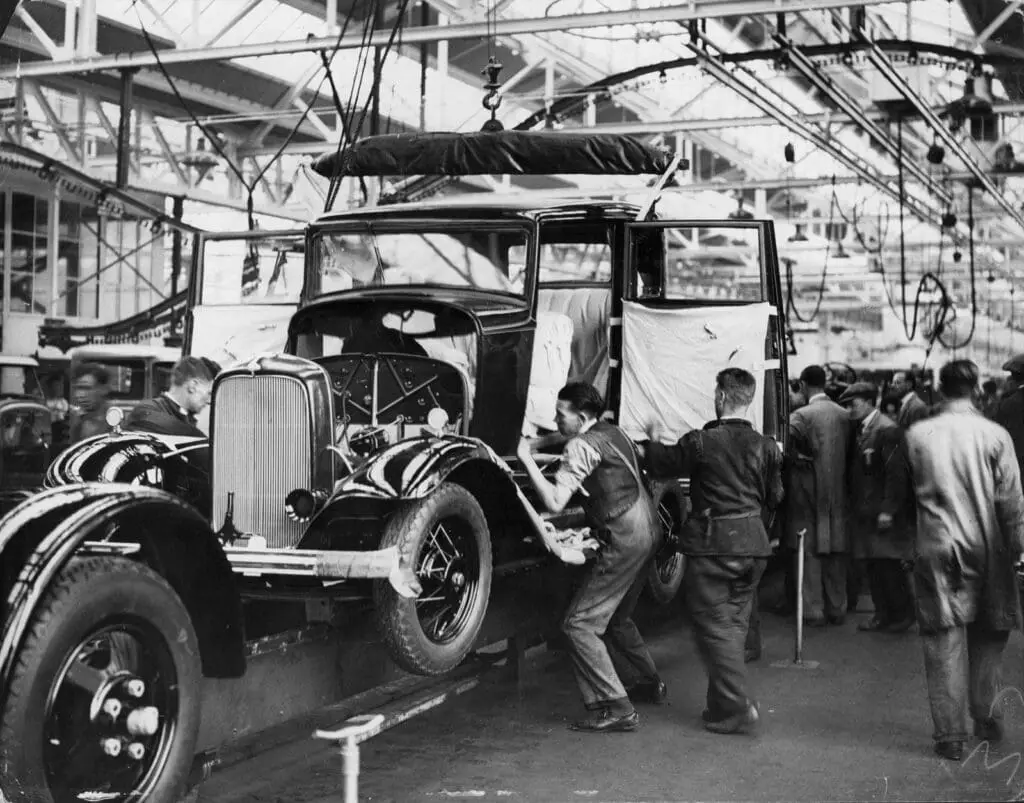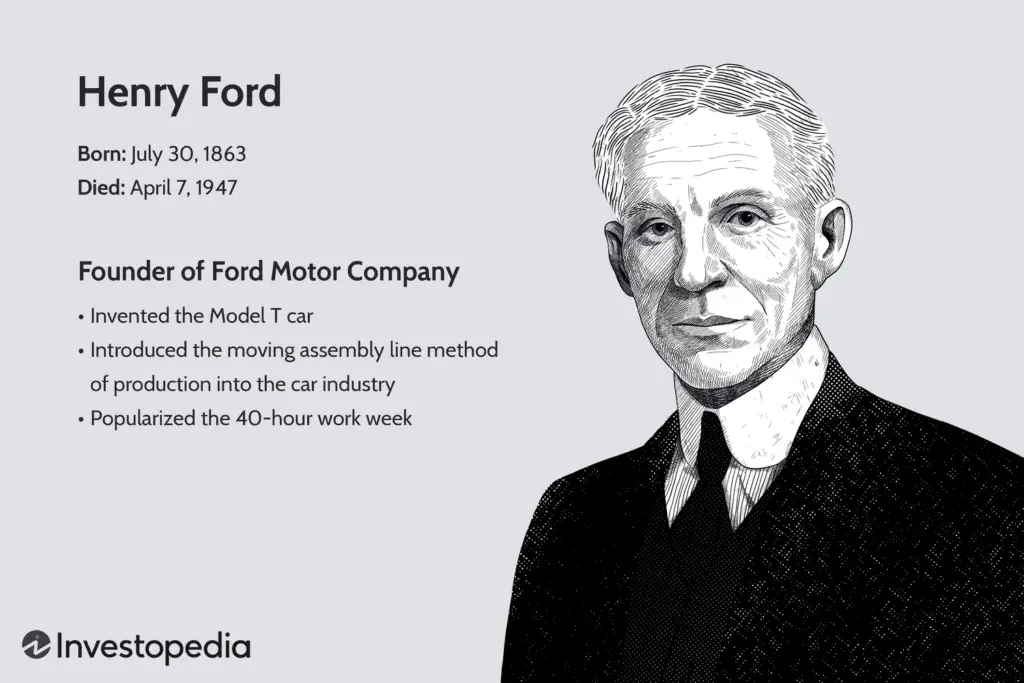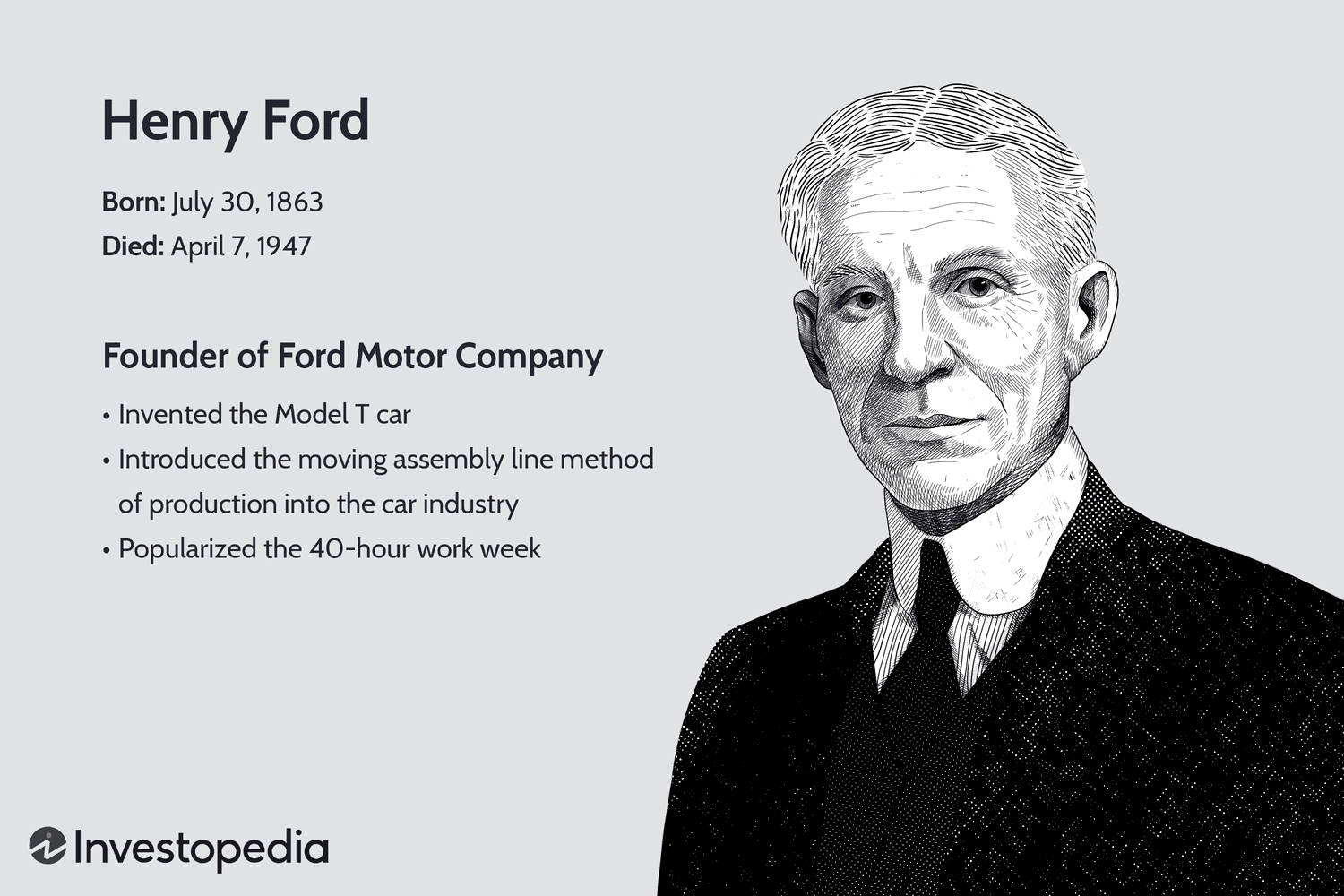Imagine a world without cars, a world where transportation meant relying on horses or walking long distances. It was a time when the idea of a personal automobile seemed like nothing more than a dream. But then, in the year 1903, a man named Henry Ford had a vision: to revolutionize transportation and make the automobile accessible to everyone. And so, the iconic Ford Motor Company was born, marking the beginning of an incredible journey that would change the world forever. Step back in time and discover the fascinating story of how Ford Motor Company came to be, and the innovative spirit that continues to drive the company to this day.

Background
Henry Ford’s Early Life
Henry Ford was born on July 30, 1863, on a farm in Greenfield Township, Michigan. Growing up, he developed a deep interest in mechanical pursuits, often tinkering with machines and equipment. Despite having limited formal education, Ford possessed a keen mind and a natural talent for innovation. His curiosity led him to learn about and experiment with a wide range of technologies.
Henry Ford’s Prior Ventures
Prior to the establishment of Ford Motor Company, Henry Ford had embarked on several entrepreneurial ventures. In 1891, he became an engineer for the Edison Illuminating Company, where he gained valuable experience working with power generators. This opportunity allowed Ford to enhance his knowledge of electrical systems, which later played a crucial role in his automobile production.
Early Years of Ford Motor Company
Henry Ford’s Inspiration for the Company
The birth of Ford Motor Company was fueled by Henry Ford’s passion for producing affordable and efficient automobiles for the masses. He was greatly inspired by the ideas of Thomas Edison and the industrial progress happening around him. Ford envisioned a world where owning a car was not just a luxury for the wealthy but a possibility for everyone.
Henry Ford’s Vision for the Company
Henry Ford held a bold and audacious vision for his company. He aimed to revolutionize the automobile industry by implementing innovative manufacturing techniques that would drastically reduce production costs, making cars more accessible to the general public. Ford believed in the concept of “Fordism,” which emphasized efficiency, mass production, and the standardization of parts.
Formation of the Company
On June 16, 1903, Henry Ford and a group of investors founded Ford Motor Company. The initial capital of $28,000 paved the way for the company’s humble beginnings. The headquarters were established in Detroit, Michigan, which would become the symbol of the American automobile industry.
Initial Challenges
The early years of Ford Motor Company were not without their fair share of challenges. Financial instability and limited resources posed significant obstacles, threatening the survival of the fledgling company. However, Ford’s determination, resilience, and unwavering belief in his vision propelled him forward, leading to the successful development of the Model T and subsequent growth of the company.
Development of Model T
Introduction of Model T
In 1908, Ford Motor Company unveiled the Model T, a groundbreaking vehicle that would forever change the automotive landscape. The Model T was an affordable, reliable, and durable automobile, priced at $850, which made it accessible to the middle class. Its simple and robust design, coupled with its superior functionality, quickly made it a popular choice among consumers.
Impact of Model T
The introduction of the Model T revolutionized the way people lived and traveled. It provided a means of transportation that was affordable, reliable, and efficient. The Model T empowered individuals and families, enabling them to explore the world beyond their immediate surroundings. This newfound mobility offered endless opportunities for economic and social growth, transforming society in profound ways.
Assembly Line Innovation
One of the most significant contributions of Ford Motor Company was the implementation of the assembly line production system. Henry Ford revolutionized manufacturing processes by introducing a continuous flow of production, where workers would perform specific tasks at designated stations as the vehicle moved along the assembly line. This innovation dramatically increased efficiency, reduced costs, and enabled the mass production of automobiles.
Growth and Expansion
Increasing Popularity of Model T
As the reputation and demand for the Model T grew, Ford Motor Company experienced remarkable success. The company sold over 15 million Model T cars, making it one of the most popular vehicles of its time. The affordability and reliability of the Model T appealed to a vast market, solidifying Ford’s position as a leading automobile manufacturer.
Expansion into International Markets
Ford Motor Company’s impact expanded beyond the borders of the United States. As the company flourished, it established manufacturing plants and sales networks in various countries worldwide, including Canada, the United Kingdom, and Australia. This global expansion allowed Ford to tap into new markets and cater to an increasingly diverse customer base.
Impact on American Society
The success of Ford Motor Company had a profound impact on American society. The affordability and availability of the Model T led to the democratization of the automobile industry. It transformed transportation, providing a means for people to commute more easily, visit distant relatives, explore new leisure activities, and enhance overall quality of life. The mobility offered by the automobile industry sparked economic growth and stimulated the development of new businesses and industries.

Labor Relations and Impact
Tumultuous Relationship with Labor Unions
Ford Motor Company’s labor relations were marked by controversy and conflict. Henry Ford’s strong-willed and sometimes confrontational approach to labor unions led to various strikes and clashes with workers. Despite these challenges, Ford implemented several innovative strategies to improve labor conditions and foster a sense of loyalty among his employees.
The Ford Sociological Department
In an effort to enhance productivity and monitor employee behavior, Ford established the Ford Sociological Department in 1913. This department conducted investigations into workers’ personal lives, encouraging them to adopt a lifestyle that aligned with Ford’s ideals. While controversial and intrusive, the department implemented welfare programs, such as profit-sharing and employee benefits, which were relatively progressive for the time.
Impact on Labor Practices
Although Ford Motor Company faced criticism for its labor practices, the company also made significant contributions to the development of modern labor practices. Ford introduced the concept of a 40-hour workweek, which provided workers with more leisure time and improved work-life balance. The success of Ford’s labor initiatives influenced other industries to adopt similar policies, leading to a broader societal shift in labor practices.
Competition and Rivalry
Rivalry with General Motors
One of Ford Motor Company’s most notable rivalries was with General Motors (GM). Both companies vied for dominance in the American automobile industry during the early 20th century. Ford’s relentless pursuit of affordability and dominance clashed with GM’s approach of offering a wide range of models, appealing to different market segments. This intense competition led to the development of new technologies and pushed both companies to innovate further.
The Rise of Chrysler
Another significant competitor that emerged during this period was Chrysler Corporation. Founded by Walter Chrysler in 1925, the company quickly gained recognition for its engineering prowess and stylish designs. The rise of Chrysler presented Ford with a new challenger in the automobile industry, further intensifying the competition and driving the industry forward.
Influence on the Automobile Industry
Ford Motor Company’s success and innovative spirit fundamentally transformed the automobile industry. The introduction of the assembly line production system and the mass-production of affordable vehicles set a precedent for the entire industry. Ford’s emphasis on efficiency and cost reduction inspired other manufacturers to adopt similar practices, leading to increased productivity and lower prices for consumers.

Changing Leadership
Henry Ford’s Succession Plan
As Henry Ford grew older, he began considering his succession plan. In 1919, he appointed his son, Edsel Ford, as the president of Ford Motor Company, preparing him to assume a leadership role in the future. This carefully orchestrated plan aimed to ensure continuity and stability within the company.
Leadership Transition
The leadership transition from Henry Ford to Edsel Ford was not without challenges. Despite Edsel’s dedication and efforts to modernize the company and introduce new car models, his tenure faced scrutiny and criticism. However, his contributions and innovative ideas laid the foundation for future success, particularly in the development of new designs and features.
Henry Ford’s Return
Upon Edsel Ford’s untimely death in 1943, Henry Ford returned to the helm of Ford Motor Company. Despite his advanced age, Ford continued to play an active role in the company’s operations. His return injected a sense of nostalgia and stability, further cementing his iconic status within the industry.
World War II and Beyond
Ford’s Contribution to the War Effort
During World War II, Ford Motor Company played a vital role in supporting the war effort. The company shifted its production to manufacture military vehicles, aircraft engines, and other essential equipment. This contribution helped meet the wartime demands and contributed significantly to the overall success of the Allied forces.
Post-War Challenges and Transformation
Following World War II, Ford Motor Company faced new challenges as the global economy transitioned to peacetime. The company shifted its focus back to consumer vehicles, introducing new models and incorporating innovative technologies. Ford’s ability to adapt to changing circumstances and provide vehicles that met the evolving needs of consumers allowed the company to thrive in the post-war era.

Legacy of Ford Motor Company
Influence on Automobile Manufacturing
The legacy of Ford Motor Company extends far beyond the development and production of automobiles. Henry Ford’s innovative techniques and production methods transformed the manufacturing industry as a whole. The concept of mass production and assembly line manufacturing pioneered by Ford became the gold standard for efficiency and productivity, influencing countless industries worldwide.
Ford Foundation and Philanthropy
Henry Ford’s commitment to social responsibility and philanthropy is evident through the establishment of the Ford Foundation in 1936. The foundation has since become one of the largest and most influential philanthropic organizations in the world, contributing to causes such as education, poverty alleviation, and social justice.
Ford’s Impact on Industrialization
Ford Motor Company’s impact on industrialization cannot be overstated. By streamlining production processes and making automobiles more affordable, Ford stimulated economic growth, created jobs, and accelerated the development of modern societies. Ford’s influence on industrial practices, labor relations, and social dynamics continues to be felt to this day.
Conclusion
The founding and growth of Ford Motor Company under Henry Ford’s visionary leadership transformed the automobile industry and society as a whole. From humble beginnings to global success, Ford Motor Company’s impact on manufacturing, labor practices, and societal mobility is undeniable. The legacy of innovation and philanthropy established by Henry Ford and continued by subsequent leaders solidifies Ford Motor Company’s place in history as an enduring symbol of American industrial prowess.



